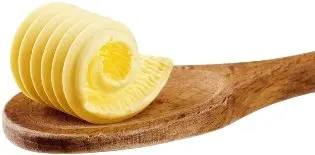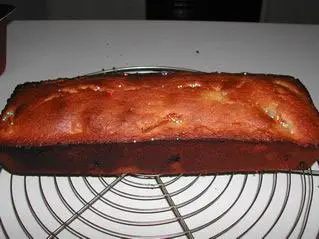This site uses only a few technical cookies necessary for its operation. By continuing to browse, you accept their use.
To find out more...
To find out more...
Butter doesn't make you fat, unless you eat too much of it.

Whenever I'm discussing cooking and recipes, there is one idea which comes up frequently, like this: "Oh no! But that's got butter in it" (I should add, for the sake of accuracy, that this is something I hear more frequently from women, who are almost all concerned with keeping their figure).
This immediately gives me the impression that butter is THE ingredient that should be banished from the kitchen, and it has been banned in a lot of so-called "healthy cooking" or "slimming" recipes, often being replaced by oil, preferably olive.
This immediately gives me the impression that butter is THE ingredient that should be banished from the kitchen, and it has been banned in a lot of so-called "healthy cooking" or "slimming" recipes, often being replaced by oil, preferably olive.
46 K 4.5/5 (22 reviews)
Keywords for this post:ButterDietWeightFatHealthVitaminLast modified on: March 26th 2012
Butter doesn't make you fat, unless you eat too much of it.
Whenever I'm discussing cooking and recipes, there is one idea which comes up frequently, like this: "Oh no! But that's got butter in it" (I should add, for the sake of accuracy, that this is something I hear more frequently from women, who are almost all concerned with keeping their figure).
This immediately gives me the impression that butter is THE ingredient that should be banished from the kitchen, and it has been banned in a lot of so-called "healthy cooking" or "slimming" recipes, often being replaced by oil, preferably olive.
As I am a fan of olive oil – I use it every day – that suits me fine, but I'm not ready to abandon butter under the pretext that because it is fat, it makes you put on weight.
Allow me then to list a few of the benefits of butter, apart from its nutritional qualities (notably Vitamin A), as its disadvantages are well known:
- Butter contains around 80% fat ; if that seems like a huge amount and you prefer the idea of oil, remember that oil is 100% fat!
- Great chefs often say, quite rightly, that butter "fixes" flavours. So adding a small amount of butter, even if it is not the main type of fat in the dish, will improve the overall flavour. Think of fresh garden peas, boiled quickly in salted water, with a knob of butter melted over them before serving – delicious!
- Butter can provide the fat needed for cooking, but in the process it adds its own subtle flavour, and this is closely tied to the quality of butter you use. It is true that this is also the case for olive oil, but not at all for sunflower or groundnut oil, which are fats with a neutral flavour.
- You will not put on any more weight through eating butter than any other fat; it's an excess of butter/fat which leads to weight gain.
- Butter can be eaten cold and can be used hot in cooking, but with certain precautions. It only becomes indigestible when burnt (ah – that awful outmoded recipe for ray with black butter).
- Without butter, there would be no French pâtisserie (cakes and pastries), or hardly any. Replacing butter with margarine does not make a good shortcrust pastry or good french croissants (for example).
But it's not just because I live in Brittany that I owe it to myself to stay faithful to butter. It is certainly true that using too much butter is neither good for the cooking nor for health, but – as in all things – it is an excess that is bad, and only an excess. If you are worried about your figure, then eat less, or only a little, but do eat the good, proper stuff.
So there is no need to deprive yourself of using butter in cooking, or take an extreme anti-butter stance, but just use it wisely. To all lovers of good food and enthusiastic cooks (like us), it is a precious ally.
I will close with a quotation attributed (allegedly) to Paul Bocuse. He was talking to an American food critic, who remarked on the quantity of butter he used in his cooking. The chef replied, "If you don't like butter or cream, there's really no point coming to France".
This immediately gives me the impression that butter is THE ingredient that should be banished from the kitchen, and it has been banned in a lot of so-called "healthy cooking" or "slimming" recipes, often being replaced by oil, preferably olive.
As I am a fan of olive oil – I use it every day – that suits me fine, but I'm not ready to abandon butter under the pretext that because it is fat, it makes you put on weight.
Allow me then to list a few of the benefits of butter, apart from its nutritional qualities (notably Vitamin A), as its disadvantages are well known:
- Butter contains around 80% fat ; if that seems like a huge amount and you prefer the idea of oil, remember that oil is 100% fat!
- Great chefs often say, quite rightly, that butter "fixes" flavours. So adding a small amount of butter, even if it is not the main type of fat in the dish, will improve the overall flavour. Think of fresh garden peas, boiled quickly in salted water, with a knob of butter melted over them before serving – delicious!
- Butter can provide the fat needed for cooking, but in the process it adds its own subtle flavour, and this is closely tied to the quality of butter you use. It is true that this is also the case for olive oil, but not at all for sunflower or groundnut oil, which are fats with a neutral flavour.
- You will not put on any more weight through eating butter than any other fat; it's an excess of butter/fat which leads to weight gain.
- Butter can be eaten cold and can be used hot in cooking, but with certain precautions. It only becomes indigestible when burnt (ah – that awful outmoded recipe for ray with black butter).
- Without butter, there would be no French pâtisserie (cakes and pastries), or hardly any. Replacing butter with margarine does not make a good shortcrust pastry or good french croissants (for example).

But it's not just because I live in Brittany that I owe it to myself to stay faithful to butter. It is certainly true that using too much butter is neither good for the cooking nor for health, but – as in all things – it is an excess that is bad, and only an excess. If you are worried about your figure, then eat less, or only a little, but do eat the good, proper stuff.
So there is no need to deprive yourself of using butter in cooking, or take an extreme anti-butter stance, but just use it wisely. To all lovers of good food and enthusiastic cooks (like us), it is a precious ally.
I will close with a quotation attributed (allegedly) to Paul Bocuse. He was talking to an American food critic, who remarked on the quantity of butter he used in his cooking. The chef replied, "If you don't like butter or cream, there's really no point coming to France".
Lasts posts
XO Cognac Explained: Meaning, Aging, and Flavor Profile
XO Cognac always goes beyond the labels on the bottle: it is often associated with tradition and quality. You get to appreciate the artistry, character and ageing process when you understand what defines this smooth Cognac. The section below tackles everything about XO Cognac, from complex flavour...January 28th 20261,005 Sponsored article
Butter vs. grease
We often read in a recipe where a pastry is put into a mould that, just before pouring, the mould should be buttered or greased. But what's the difference between these 2 terms?December 1st 20252,6455
Getting out of the fridge early
Very often when you're cooking, you need to take food or preparations out of the fridge, to use them in the recipe in progress. There's nothing tricky about this: you just take them out of the fridge and use them, usually immediately, in the recipe. But is this really a good method?November 24th 20251,6995
Who's making the croissants?
When you look at a bakery from the outside, you naturally think that in the bakery, the bakers make the bread, and in the laboratory, the pastry chefs make the cakes. It's very often like that, with each of these professions having quite different ways of working, but sometimes there's also one...November 23th 20251,551
Oven height
When we put a dish or cake in the oven, we naturally tend to put it on the middle shelf, and that's what we usually do. But in some cases, this position and height can be a little tricky, so let's find out why.October 8th 20255,2225
Other pages you may also like
Tranché, dissociated, failed, in short... missed!
When preparing a sauce or a cream, there's always a (small) risk that the creamy preparation you're working on will suddenly separate into two parts of different textures: a liquid part, for example, and a more or less solid part, or even become lumpy. It's terribly frustrating, but we'll see...June 19th 202314 K5
Sausage broth
I've already talked to you about vegetable cooking water, which becomes a precious broth after cooking that would be a shame to throw away. Now let's look at the special case of meat cooking broth, and in particular sausages, which are often poached.June 28th 202313 K5
Toss the salad
When you've finished preparing a salad, green or otherwise, it's usually time to add the dressing and toss. It's often said to "toss the salad", which means to season and mix. Is it easy? Not so easy...March 8th 202413 K5
No need to boil gelatin
Gelatin is a magical ingredient for making light, creamy, structured desserts, yet it's often misused in the kitchen. A common mistake in some recipes is the idea that it needs to be boiled for it to work properly, but this is a mistake indeed: gelatin melts at a much lower temperature, around...November 21th 20249,2225
The march forward
When professionals get to work in their kitchen, lab or bakery, they are (if they are conscientious) very sensitive to hygiene and cleanliness. It is impossible for a good baker for example to do a day's work without regularly cleaning the table where he or she works, and it is even more...June 30th 202120 K5
Post a comment or question
Follow this page
If you are interested in this page, you can "follow" it, by entering your email address here. You will then receive a notification immediately each time the page is modified or a new comment is added. Please note that you will need to confirm this following.
Note: We'll never share your e-mail address with anyone else.
Alternatively: you can subscribe to the mailing list of cooling-ez.com , you will receive a e-mail for each new recipe published on the site.









